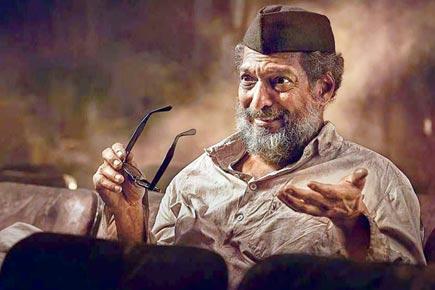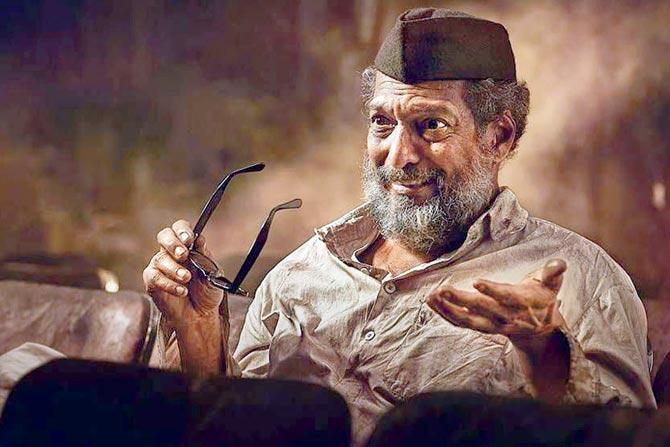There is an unintentional gag in Natsamrat (King of Theatre), the Marathi film starring Nana Patekar, that is currently all the rage amid Marathi-speaking audiences.

Nana Patekar plays a retired Shakespearean theatre actor in Natsamrat
 There is an unintentional gag in Natsamrat (King of Theatre), the Marathi film starring Nana Patekar, that is currently all the rage amid Marathi-speaking audiences. Patekar plays retired Shakespearean theatre actor Ganpatrao Belvalkar who, having given away all his property to his children, winds up on the street after his children humiliate him. Director Mahesh Manjrekar chooses to stage Hamlet’s famous “To be or not to be” soliloquy at a party, where Belvalkar arrives late and drunk — “phool tight.” When his daughter dissuades him from drinking more, he declares, “To pee or not to pee, that is the question.” He means to drink or not to drink in Marathi, but his Minglish (Marathi+English) rather implies “to piss or not to piss, that is the question”. Thus Hamlet’s existential dilemma seems reduced to the search for a loo. You yourself might your quietus make with a bare bodkin.
There is an unintentional gag in Natsamrat (King of Theatre), the Marathi film starring Nana Patekar, that is currently all the rage amid Marathi-speaking audiences. Patekar plays retired Shakespearean theatre actor Ganpatrao Belvalkar who, having given away all his property to his children, winds up on the street after his children humiliate him. Director Mahesh Manjrekar chooses to stage Hamlet’s famous “To be or not to be” soliloquy at a party, where Belvalkar arrives late and drunk — “phool tight.” When his daughter dissuades him from drinking more, he declares, “To pee or not to pee, that is the question.” He means to drink or not to drink in Marathi, but his Minglish (Marathi+English) rather implies “to piss or not to piss, that is the question”. Thus Hamlet’s existential dilemma seems reduced to the search for a loo. You yourself might your quietus make with a bare bodkin.

Nana Patekar plays a retired Shakespearean theatre actor in Natsamrat
ADVERTISEMENT
The film certainly has its appeal, focussing on the loneliness of an ageing actor, family friction arising from his inability to switch off his theatrical persona in real life, and the ingratitude of his children. Its screenplay, by Mahesh Manjrekar, Kiran Yadnopavit and Abhijeet Deshpande — adapted from Kusumagraj (VV Shirwadkar’s) classic play of the same name — and memorable performances by Nana Patekar and Vikram Gokhale, undoubtedly offer poignant moments. When Belvalkar’s daughter, who had accused him of stealing, says penitently, “I won’t let you go,” he replies, “You have lost that right.” (The film comes with English/Minglish subtitles).
Loneliness in old age is an evergreen theme. In having a Shakespearean actor as protagonist, the film also acknowledges the liberal worldview of Marathi theatre. However, Natsamrat cuts unconvincingly between scenes from Belvalkar’s stage and real lives, and the ponytailed, US-returned sutradhar is a poorly scripted nod to NRI Maharashtra Mandals. Moreover, the unrelenting melodrama — Nana walks the streets of Mumbai, asking, “Can someone provide a home please?” — reduces a poignant film to three-hanky territory. In fact, the soul of Natsamrat is King Lear, the tragedy of an ageing father and his daughters’ betrayal. At the climax of King Lear, all the leads are dead—King Lear and his three daughters Cordelia, Regan and Goneril. But Natsamrat plays to the gallery, as a shoeshine, Raja, tells Belvalkar not to return to his family because “aapun hamesha hai aap ke liye” or somesuch. Significantly, Raja’s character acknowledges that homeless Muslims can be more caring than your own rich Hindu family; a far cry from the-Muslim-must-be-the-villain of another roaring Marathi hit, Katyar Kaljat Ghusli (A Dagger in the Heart).
Patekar is impressive as Belvalkar, who is stripped of all dignity. But Vikram Gokhale practically steals the thunder playing Rambhau, his better but less acclaimed fellow actor. Veterans remember the stage version partly for Dr Shreeram Lagoo’s understated acting. But Manjrekar’s Natsamrat is determined to squeeze out your tears. Ravi Jadhav’s Natarang, starring Atul Kulkarni, had brought more complex dimensions to an actor’s struggles—creative, personal and familial. Mahesh Bhatt’s moving Saaransh (1984), also on a lonely, ageing Maharashtrian couple (Anupam Kher and Rohini Hattangadi), who have lost their only son, resolutely abstained from melodrama. Piku even had the guts to go beyond parents-as-victims and observe how selfish ageing parents can also be: Piku’s father wants her to stay single, so she can be his one-point retirement plan. This brutally honest observation by scriptwriter Juhi Chaturvedi is remarkable, given this is mata-pita-Parmeshwar country. And even Go Mata-Pita-Parmeshwar territory.
Marathi cinema has had a good run in recent years because, apart from good screenwriters and filmmakers, a discerning audience has patronised good films. The Marathi stage has been at the forefront of Indian experimental theatre, with loyal audiences for the plays of Vijay Tendulkar, Satish Alekar, Mahesh Elkunchwar, Makrand Deshpande, Mohit Takalkar and Manaswini Ravindra, among others. An overlapping audience has also sustained good Marathi films by the younger generation, including Chaitanya Tamhane’s Court, Avinash Arun’s Killa, Umesh Kulkarni’s Vihir, Ravi Jadhav’s Natarang, Nagraj Manjule’s Fandry, Satish Manwar’s Gabhricha Paus and Sachin Kundalkar’s Gandha. All these films have dealt sensitively with social issues and more, yet their narratives have refused to play to the gallery. Natsamrat is a huge box office hit; good for the filmmakers and presenters. It says a great deal about Marathi cinema and its audiences, that would make a film on an ageing Shakespearean actor a hit. Bollywood has a lot of catching up to do.
Meenakshi Shedde is South Asia Consultant to the Berlin Film Festival, award-winning critic, curator to festivals worldwide and journalist. Reach her at meenakshishedde@gmail.com.
 Subscribe today by clicking the link and stay updated with the latest news!" Click here!
Subscribe today by clicking the link and stay updated with the latest news!" Click here!







